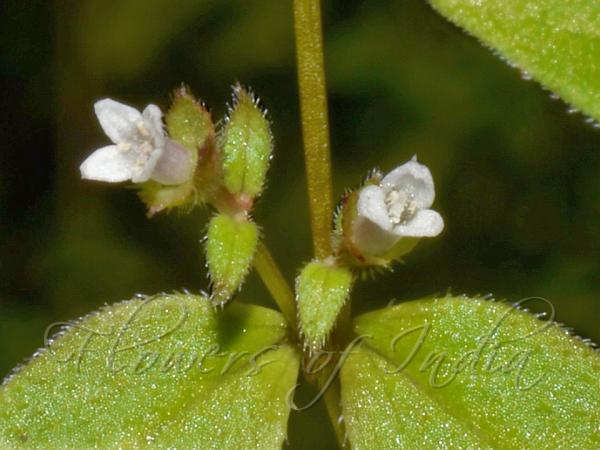|
| Large-Sepal Starviolet |
|

|

| File size | 173046 |
| Original date | 12/28/22 8:30 PM |
| Resolution | x |
| Flash | Flash fired, return detected |
| Focal length | 55.0mm |
| Exposure time | 1/200s |
| Aperture | 36.0 |
| Focus Distance | |
| Metering Mode | $meteringMode |
| Camera make | NIKON CORPORATION |
| Camera model | NIKON D5600 |
| Sensor type |
|
|
|
|
Photo: |
Botanical name: Neanotis calycina Family: Rubiaceae (Coffee family)
Synonyms: Hedyotis calycina, Hedyotis pahompokae, Neanotis pahompokae
Synonyms: Hedyotis calycina, Hedyotis pahompokae, Neanotis pahompokae
Large-Sepal Starviolet is an erect to rising up,
annual or perhaps perennial herb with stems 4-angled to almost round or
grooved, hairless or sparsely finely velvet-hairy. Flowers are white,
pale pink, or pale purple, tubular to tubular-funnel-shaped, outside
hairless; tube 1.5-2 mm, apparently hairless in throat; petals
triangular to lanceshaped, 0.5-1 mm, blunt to pointed. Flowers are
stalkless or with up to 7 mm stalk. Sepal-cup is hairless, about 0.8
mm; limb divided essentially to base into triangular sepals 0.5-1.3 mm,
entire to fringed, pointed. Flowers are borne singly or in several
flowered cymes, carried on flower-cluster-stalks 0.5-2.5 cm long.
Leaves are nearly stalkless or stalked, lanceshaped to
ovate-lanceshaped or lanceshaped-elliptic, 1-3.5 x 0.5-1.5 cm, above
sparsely rough to finely velvet-hairy, below hairless or finely
velvet-hairy to rough on principal veins, base wedge-shaped to pointed,
margins fringed with hairs to rough, tip pointed to tapering; secondary
veins 3 or 4 pairs. Capsules are compressed spherical, 1.5-2 x about 3
mm, hairless. Large-Sepal Starviolet is found in the Himalayas, from
Kashmir to NE India, Burma, Indo-China, W China and Western Ghats, at
altitudes of 1000-3200 m. Flowering: September-December.
| Identification credit: Ashutosh Sharma | Photographed in Kullu District, Himachal Pradesh. |
• Is this flower misidentified? If yes,